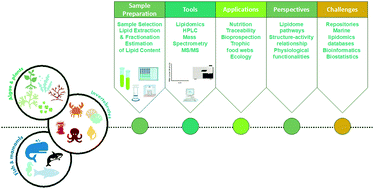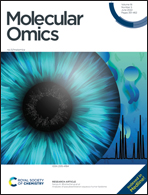Applications of lipidomics in marine organisms: progress, challenges and future perspectives†
Abstract
Marine ecosystems comprise a high diversity of life forms, such as algae, invertebrates, and vertebrates. These organisms have adapted their physiology according to the conditions of the environments in which they inhabit. In the last few years, the study of lipids of marine origin has received increasing attention due to the diversity of their composition. The progress of analytical techniques such as LC-MS and MS/MS has allowed researchers to improve accurate processing of samples and lipid characterization. Lipidomics is a useful research field to understand marine ecosystems and the physiology of their organisms. The screening of biological systems in marine environments has demonstrated a significant diversity of lipids in their living resources. In this review, we provide the state-of-the-art marine of lipidomics studies. We describe in detail the lipidomics approach for the analysis of marine lipidomes, including sample collection and preparation, interpretation of MS/MS fragmentation fingerprinting, data analysis and processing. Special attention is also given to illustrate the latest applications and advances of applied LC-MS lipidomic analyses in diversified studies of different marine organisms, as well as the challenges and future perspectives of marine lipidomics.



 Please wait while we load your content...
Please wait while we load your content...